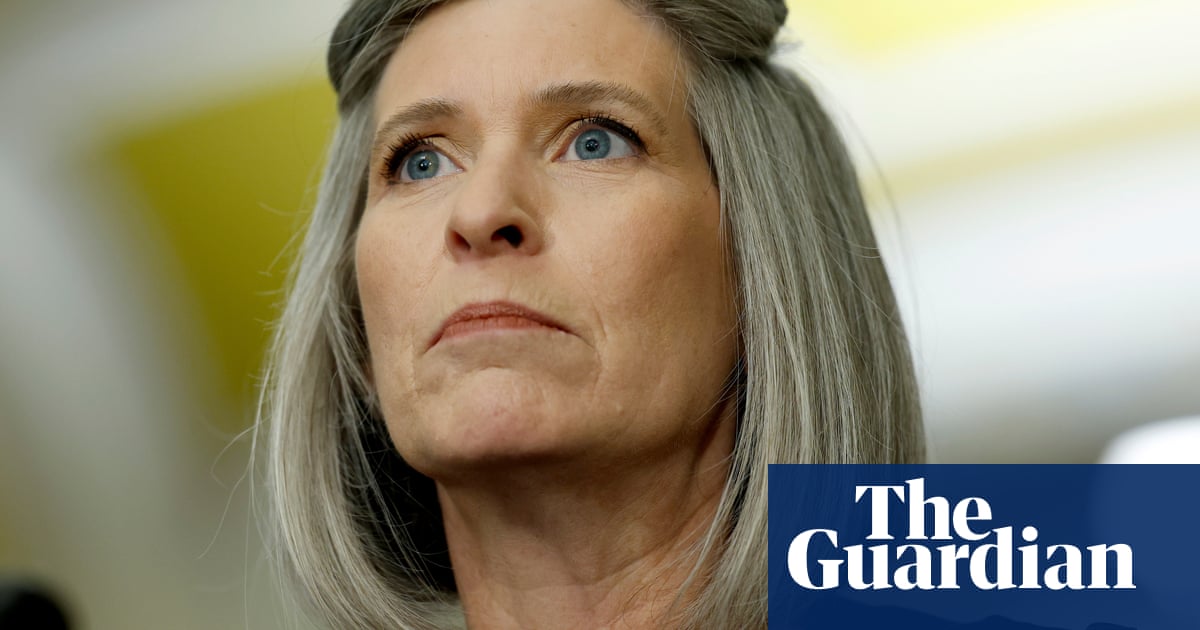Senator Joni Ernst triggered fierce criticism after making light of voters’ fears that RepublicanMedicaidcuts could prove fatal, telling a town hall audience “we all are going to die” and then filming a mocking response video over the weekend.
TheIowaRepublican, who is facing a possibly challenging re-election battle in 2026, was explaining at a Friday town hall how the Republican immigration and tax package would affect Medicaid eligibility when an audience member shouted that people could die if they lost coverage through the proposed cuts.
“Well, we all are going to die,” Ernst responded as the crowd groaned. “So, for heaven’s sakes. For heaven’s sakes, folks.”
Rather than clarify or apologize, Ernst channeled Trump-era defiance in her response on Saturday with an Instagram video that appeared to be filmed in a graveyard.
“I made an incorrect assumption that everyone in the auditorium understood that, yes, we are all going to perish from this earth,” she said. “So I apologize, and I’m really, really glad that I did not have to bring up the subject of the tooth fairy as well.”
She concluded by telling viewers: “For those that would like to see eternal and everlasting life, I encourage you to embrace my Lord and savior Jesus Christ.”
The controversy comes as SenateRepublicansprepare to tackle the so-called “One Big Beautiful Bill”, which passed the House and would slash social safety net spending by more than $1tn over a decade. Congressional Budget Office projections suggest the measure could strip Medicaid coverage from 8.7 million people and leave 7.6 million more Americans uninsured.
On Monday afternoon, the White House defended the legislation with a “mythbuster” statement dismissing claims that the bill would cause deaths as “one of Democrats’ most disgusting lies”.
The White House argued the bill would actually “strengthen and protect the social safety net” by removing what it claimed were 1.4 million undocumented people from Medicaid rolls and implementing work requirements for able-bodied adults.
“By removing at least 1.4 million illegal immigrants from the program, ending taxpayer-funded gender mutilation surgeries for minors, and eliminating waste, fraud, and abuse, the One Big Beautiful Bill will ensure Medicaid better serves the American people,” the statement read.
Senate Republicans acknowledge the House-passed bill will undergo significant revisions, with several Republican senators seeking changes to the Medicaid provisions. Ernst’s comments have also provided Democrats with potent ammunition for their argument that Republicans prioritize tax cuts for wealthy Americans over healthcare for ordinary citizens.
Democratic National Committee chairperson Ken Martin said Ernst had “said the quiet part out loud”, arguing Republicans don’t care “whether their own constituents live or die as long as the richest few get richer”.
Senator Chris Murphy of Connecticut told CNN on Sunday that the Republican bill “is about life and death”.
Sign up toThis Week in Trumpland
A deep dive into the policies, controversies and oddities surrounding the Trump administration
after newsletter promotion
“Everybody in that audience knows that they’re going to die. They would just rather die in old age, at 85 or 90, instead of dying at 40,” Murphy said. “And the reality is that, when you lose your healthcare, you are much more at risk of early death.”
In Iowa, the stakes are notably high, with roughly one in five residents relying on Medicaid coverage, including half of all nursing home residents, according to theKaiser Family Foundation.
Ernst attempted damage control during Friday’s town hall, insisting Republicans would “focus on those that are most vulnerable” and protect people who meet Medicaid eligibility requirements.
The senator faces several primary challengers as she seeks a third term, with the Medicaid controversy potentially complicating her political positioning in a state where healthcare access remains a key voter concern. In December, she was attacked by herright-flankfor being a “Rino” after initially hesitating on confirming the secretary of defense,Pete Hegseth.
Her office did not respond to a request for comment.
